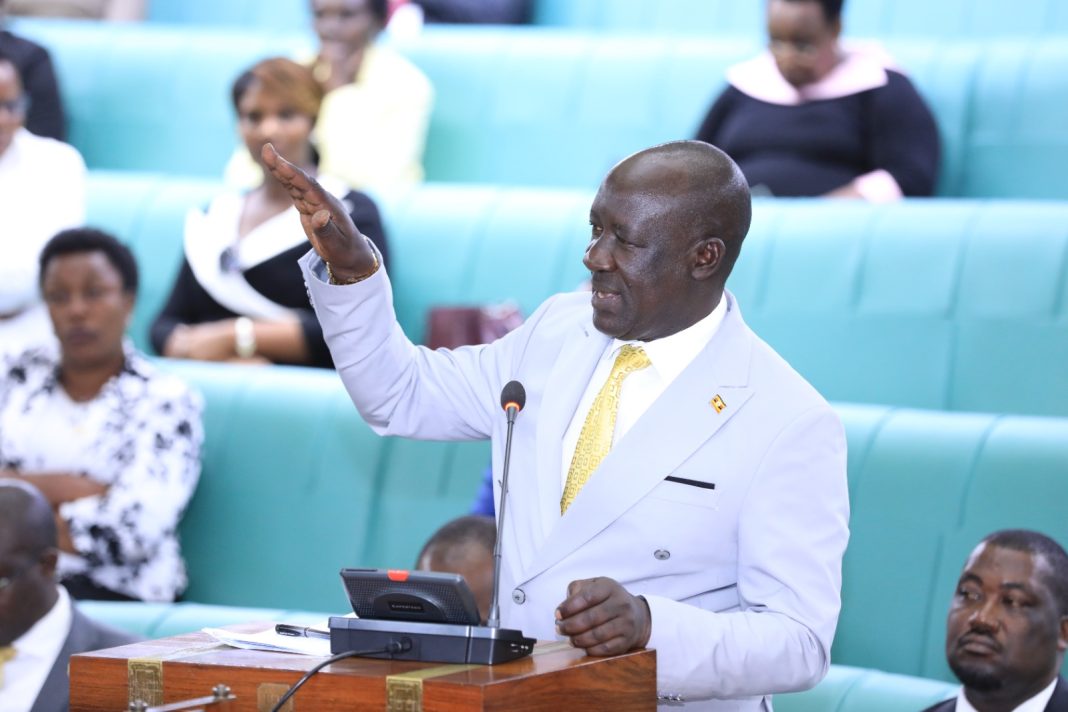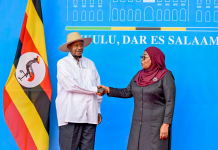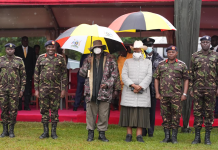The State Minister for Works, Hon. Musa Ecweru, has disclosed that the deteriorating condition of some roads across the country is largely due to a UGX 1.3 trillion debt owed by the now streamlined Uganda National Roads Authority (UNRA) to various contractors.
His remarks came in response to concerns raised by a section of Members of Parliament over the crumbling state of roads and bridges nationwide. These issues were brought to light during a parliamentary sitting chaired by Deputy Speaker Thomas Tayebwa as the House debated the Committee on Physical Infrastructure’s report on sector budget priorities for the 2025/2026 financial year.
Minister Ecweru explained that the ministry had inherited a significant financial burden resulting from UNRA’s unsettled obligations for several stalled or incomplete infrastructure projects.
He clarified that UNRA’s primary function was to oversee the contracting process, rather than directly handle the construction or maintenance of infrastructure.
Ecweru pointed out that the backlog in contractor payments has led to legal battles, with some contractors having their machinery seized.
“For instance, the government-funded Mityana-Mubende road project is being executed by Energo, a firm that is still owed about UGX 60 billion. The company is now entangled in court disputes initiated by fuel suppliers, and it’s also under pressure from the bank,” Ecweru stated.
However, Deputy Speaker Tayebwa expressed discontent with the minister’s remarks, accusing him of diminishing the role that UNRA has played over the years.
“Your comment about UNRA is regrettable. If recorded, it would imply that Parliament was allocating funds in vain yet UNRA carried out considerable work, including procurement and supervision. When UNRA was still managing affairs, contractors remained active on sites. But when you took over, they vanished,” Tayebwa retorted.
He went on to emphasize that the contributions made by UNRA’s leadership and technical staff should not be downplayed.
“Those UNRA engineers worked alongside you and received your praise. Now you’re suggesting they merely handled procurement. They delivered immense value, and that should be officially acknowledged,” Tayebwa insisted on Wednesday, 16th April 2025.
Hon. Tonny Awany, Chairperson of the Physical Infrastructure Committee, highlighted that many road projects have suffered delays due to frequent design modifications, which have also inflated project costs.
“For example, the Busega-Mpigi Expressway was initially contracted at UGX 547 billion. But due to insufficient preliminary designs, subsequent changes pushed the total cost to UGX 1.3 trillion. By 2024, funds allocated for civil works had already been exhausted, yet the physical progress stood at just 40%, putting the project at risk of further payment delays and legal complications,” Awany noted.
He also cited the Kampala-Jinja Expressway as an example of financial losses, pointing out that the government has already spent UGX 6 billion in commitment charges.
Otuke County MP, Hon. Paul Omara, questioned why the government halted the construction of the 179-kilometre Lira-Aloi-Kotido-Abim road, which traverses six districts, despite all necessary preparations being completed.
“Why was the road dropped from the National Development Plan after compensation was concluded and design changes approved? How do we defend government planning in such cases?” Omara asked.
Meanwhile, Buhweju County MP, Hon. Francis Mwijukye, pointed out that the road connecting Buhweju to Bushenyi District has been excluded from the upcoming budget, even though a contractor had been secured and a formal agreement signed.
Bukimbiri County MP, Hon. Eddie Kwizera, urged the ministry to prioritize a manageable number of road projects that align with the available budget.
“The report lists 65 roads identical to last year’s number. Why can’t we focus on what we can fund instead of raising false hopes among citizens?” he questioned.
He added, “Do we use metrics like economic rate of return and international benchmarks to select roads for development, or are decisions influenced by political considerations such as where a minister’s spouse is from?” Kwizera challenged.























